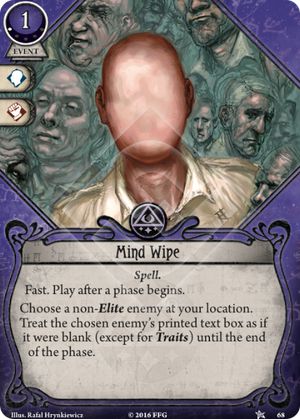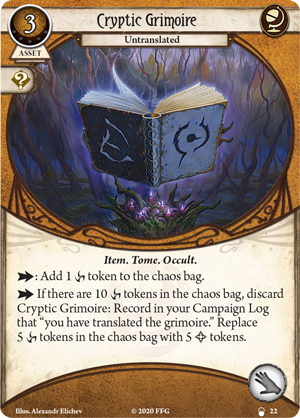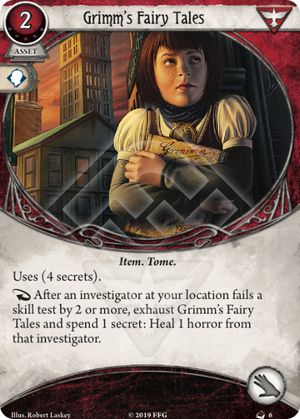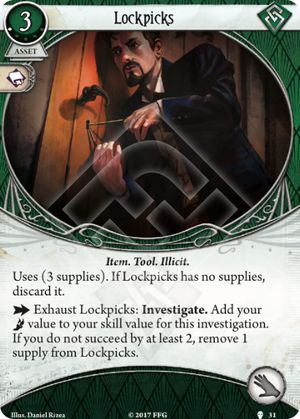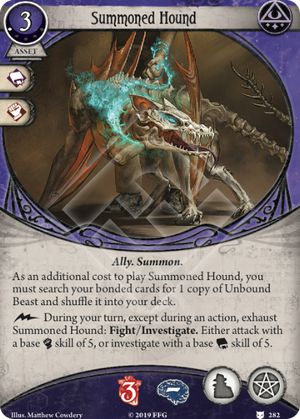
A NOT-VERY-SHORT GUIDE TO GOOD AND EVIL DOGGOS
So, I have put a LOT of thought into this card, and run a lot of tests. I loved the idea of bending the monsters of the Mythos to your will and the pursuit of good, a la Bind Monster from the original Arkham Horror game. I've found that the free actions and boosted stats are extremely useful and reliable, even in time-pressed scenarios. As it stands, I think there are two main paths to maximizing your Summoned Hound profit, with a few other possible tactics in the background. The first is to avoid the bad dog entirely, thus negating almost the entire downside of such a powerful card (unfortunately, there is no real way to mitigate the taxing ally-and-arcane-slot cost beyond getting more of those slots). The second is to use other Mystic tech to avoid actually facing the card.
Now, I'd like to go through each class and showcase what they can do with this card.
OFF-CLASS TECH
First off, Survivors, which currently means Patrice Hathaway or Agnes Baker. They fall into the never-Beast category, using Flare and A Chance Encounter to put the evil doggo into play without the corresponding weakness. They also have access to skills like Stunning Blow and Resourceful to get more value out of their dog actions, and ways to ensure even higher-difficulty investigations or fights can be accomplished without you spending an action. Just sit back and let that random stray...dog?...you picked up in an alley rip out the throats of your enemies and snuffle out clues! Plus, if you are Patrice, you can use Quick Learner to make your dog actions even more effective, as long as you trigger them late in your turn.
Secondly, Guardians, so Diana Stanley or Carolyn Fern. They really get to bring out the most violence from their investigator's-best-friends, with Vicious Blow and Inspiring Presence making their fighting more effective. Diana is the clear winner, though, because her Dark Insight literally starts in her hand and can reshuffle Unbound Beast if you ever draw it. This makes her one of the best options for the bad dog mitigation strategy.
Third, Seekers, meaning Daisy Walker (or technically Norman Withers, but he doesn't get high-level Seeker assets and his personal ability means it's basically impossible to mitigate the bad dog). Daisy already has 5 Intellect, but her Fight is pitiful and extra actions are always good, so don't rule out the good boys just yet. Seekers have access to exactly one shenanigan: Markings of Isis. This avoids putting in the bad dog, but is also something of a mediocre card, and unless you have an extra Arcane Slot will have to be discarded when you drop your second Hound (although since it only has 3 charges that's probably no great loss at that point).
The last class on this list is Rogue, so Sefina Rousseau or Dexter Drake. They don't have any way to avoid adding the bad dog to their deck, but they do have Think on Your Feet and Elusive to get the hell out of there once it arrives, and plenty of skills to do weird doggo shenanigans with. Dexter Drake can also easily discard the dog with his personal ability if he knows it's coming. How would he know, you might ask? Well, let me tell you in the next section!
MYSTIC TECH
Now, the Mystics have some tricks up their own sleeves for the purpose of mitigating doggo disasters, or improving your dog actions. Alyssa Graham can check your topdeck every turn for the bad dog, and then add a Doom to put it away (or if you really can't afford that Doom, use something else to shuffle your deck or get rid of the good dog ASAP. If you're ok with (what is currently) playtest material, Ikiaq (from an Arkham Nights Card Council) can hold off the weakness for a little while while you figure out how else you're gonna deal with it. Both of these, though, require an extra Ally Slot if you want to run them alongside a dog, and since I personally recommend a copy of Charisma so you can have two good boys at once, that can be taxing. Similarly, Empower Self and its siblings can be quite strong for boosting you to 7 on dog tests, but they require an additional Arcane Slot.
CONCLUSION
Well, I hope that this review of options has made some folks seriously consider the fun of summoning monsters to your aid. I recommend Survivor, Guardian, or Seeker access (in that order of priority) so you can maximize benefits and minimize costs associated with the Hounds. In my games, I found them to be extremely action-efficient, a lot of fun, and an interesting deckbuilding direction that offers you a little bit of a different angle from your standard Mystic tricks. Plus, the roleplaying and jokes they provide are really cool!
They do need some exercise, so be sure to take your new pets out on the town for a bit of...sport.
